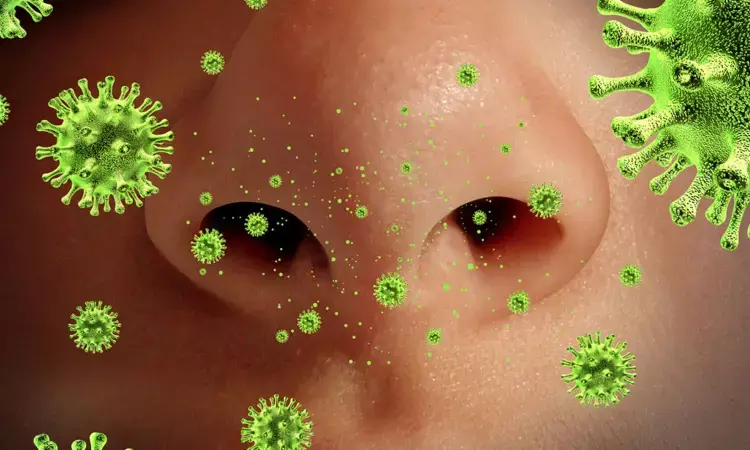- Home
- Medical news & Guidelines
- Anesthesiology
- Cardiology and CTVS
- Critical Care
- Dentistry
- Dermatology
- Diabetes and Endocrinology
- ENT
- Gastroenterology
- Medicine
- Nephrology
- Neurology
- Obstretics-Gynaecology
- Oncology
- Ophthalmology
- Orthopaedics
- Pediatrics-Neonatology
- Psychiatry
- Pulmonology
- Radiology
- Surgery
- Urology
- Laboratory Medicine
- Diet
- Nursing
- Paramedical
- Physiotherapy
- Health news
- Fact Check
- Bone Health Fact Check
- Brain Health Fact Check
- Cancer Related Fact Check
- Child Care Fact Check
- Dental and oral health fact check
- Diabetes and metabolic health fact check
- Diet and Nutrition Fact Check
- Eye and ENT Care Fact Check
- Fitness fact check
- Gut health fact check
- Heart health fact check
- Kidney health fact check
- Medical education fact check
- Men's health fact check
- Respiratory fact check
- Skin and hair care fact check
- Vaccine and Immunization fact check
- Women's health fact check
- AYUSH
- State News
- Andaman and Nicobar Islands
- Andhra Pradesh
- Arunachal Pradesh
- Assam
- Bihar
- Chandigarh
- Chattisgarh
- Dadra and Nagar Haveli
- Daman and Diu
- Delhi
- Goa
- Gujarat
- Haryana
- Himachal Pradesh
- Jammu & Kashmir
- Jharkhand
- Karnataka
- Kerala
- Ladakh
- Lakshadweep
- Madhya Pradesh
- Maharashtra
- Manipur
- Meghalaya
- Mizoram
- Nagaland
- Odisha
- Puducherry
- Punjab
- Rajasthan
- Sikkim
- Tamil Nadu
- Telangana
- Tripura
- Uttar Pradesh
- Uttrakhand
- West Bengal
- Medical Education
- Industry
Invasive fungal sinusitis seen in Indian diabetes patients post COVID-19: Study

Maharashtra: In patients with COVID-19 infection, physicians must be aware of the possibility of invasive secondary fungal infections, particularly among patients with pre-existing risk factors like diabetes, the researchers state in a study; this enables early diagnosis and treatment, reducing morbidity and mortality.
"It is an unrelenting disease process that requires the greatest care, and for future reference, our case series provides an in-depth look at four such cases," Chetan Ingle, Assistant Professor, Seth Gordhandas Sunderdas Medical College (GSMC) and King Edward Memorial (KEM) Hospital, Mumbai, Maharashtra, India, and colleagues wrote in their study published in JAPI (Journal of the Association of Physicians of India).
Invasive fungal sinusitis is an invasive disease linked with high mortality of up to 60%. In COVID-19 patients, there is a well-documented risk of rhino-orbital-cerebral fungal co-infection. The research team from India aimed to determine the factors that lead to the development, the natural history of progression and the therapeutic interventions performed for this grave complication.
For this purpose, the researchers included patients admitted to the general medicine ward of the King Edward Memorial (KEM) Hospital in Mumbai. They noted the history and examination findings of the patients. Imaging studies like MRI and CT scans were also reported. Operative procedures like abscess drainage, functional endoscopic sinus surgery (FESS), and dental extraction were performed at the hospital details were taken. Also, sugar monitoring, renal function test, fungal cultures, complete blood counts, chest X-rays, amphotericin charting, and ECGs were done. A total of 135 adults were included in the study.
The authors reported the following findings:
- The incidence of invasive fungal disease was 26.7% (14.1% were aspergillosis, and 12.6% were yeast infections like Candida).
- The overall mortality rate was 38%, 53 and 31% in patients with and without the fungal disease.
- The mortality rate was reduced using antifungal therapy [mortality: 38.5% in patients receiving treatment vs 90% in patients not receiving therapy].
- The use of corticosteroids and a history of chronic respiratory disease increased the likelihood of aspergillosis.
- All the admitted patients had some form of cranial nerve involvement in ptosis, impaired vision, ophthalmoplegia, facial nerve palsy, etc. Angio invasive nature of mucormycosis could be evident in the form of necrosis of the soft palate.
- Everyone had poor oral hygiene, three of which developed palatal perforation and necrosis.
- Fungal culture in patients three and four had grown Rhizopus spp. While patient two's culture plate had increased Aspergillus, patient one's culture plate demonstrated visible fungal elements.
- Patients had 1–3 settings of FESS with crust removal and local debridement.
- Patient one had dental extraction, and patient three needed craniotomy and drainage of the right temporal abscess.
- Each patient received around 2.2–3.36 gm of injectable conventional amphotericin B followed by T. voriconazole or T. posaconazole. The patients described above with COVID-19 infection were long-standing diabetics.
"To achieve a therapeutic effect at the lowest dose possible and for the shortest duration necessary, the use of therapeutic agents should be monitored," the authors wrote.
Early surgical interventions like drainage of the abscess, FESS, and debridement of the necrosed part should be instituted early to prevent mortality and morbidity.
Reference:
Ingle C, Goyal A, Hange S. Invasive Fungal Sinusitis in Post-COVID-19 Patients with Diabetes Mellitus. J Assoc Physicians India 2022;70(11):75–78
Dr Kamal Kant Kohli-MBBS, DTCD- a chest specialist with more than 30 years of practice and a flair for writing clinical articles, Dr Kamal Kant Kohli joined Medical Dialogues as a Chief Editor of Medical News. Besides writing articles, as an editor, he proofreads and verifies all the medical content published on Medical Dialogues including those coming from journals, studies,medical conferences,guidelines etc. Email: drkohli@medicaldialogues.in. Contact no. 011-43720751


